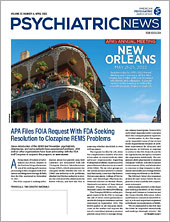Career development, finding your academic niche, climate change—these are some of the Annual Meeting sessions designed especially for resident and fellow members (RFMs) and early career psychiatrists (ECPs).
Art Walaszek, M.D., a member of the Scientific Program Committee and chair of the ECP/RFM Subcommittee, said the sessions are designed to meet the career needs of younger psychiatrists and their interests in exploring the boundaries of what is possible in psychiatric practice. The sessions also provide opportunities for RFMs and ECPs to explore pressing social issues of interest to them.
At press time, sessions were still being finalized, but these three have been confirmed:
•
Medical Education Scholarship: Finding Your Niche. Many educators find themselves in positions in academic medicine that are heavy on clinical duties, administrative tasks, and primary teaching but have little to no time for mentoring for scholarly pursuits. This can foster disillusionment and burnout, especially when institutional expectations for scholarly outputs are not met. In this workshop, participants will talk about educational scholarship not as an extra task in an already full workload, but as something that can be done in the process of typical educational activities, such as teaching in clinical environments or preparing sessions for the classroom. In other words, scholarship can be successfully achieved when educators “make it count twice” with their educational activities.
Paul Haidet, M.D., a professor of medicine at the University of Pennsylvania Perelman School of Medicine, will lead this interactive session about how young psychiatrists can find their own path in academic medicine. Haidet has carved his own path combining his love of jazz music with medicine and ways to better communicate with patients using the art of improvisation. He has a
Twitter account, where he tweets about medicine, health care, and jazz.
•
Outside the Box: Using Your Degree to Influence Beyond the Field. After many years of education and training, most psychiatrists are laser focused on jumping into direct service—setting up a practice, onboarding at a hospital, or teaching at an academic institution. But what about using clinical training to make an impact outside of the field of psychiatry? The many social determinants of mental health indicate that the need has never been more urgent. Drawing on their experiences as licensed psychiatrists, the speakers in this session—Nina Vasan, M.D., Jessica Gold, M.S., M.D., and Amir K. Ahuja, M.D.—will discuss how they integrated their training into alternative career paths. Vasan is chief medical officer at REAL, an innovative mental health care company; Ahuja is director of psychiatry at the Los Angeles LGBT Center; and Gold is a freelance writer and TV commentator.
•
Shrinking the Carbon Footprint of American Psychiatry: Meeting the Demands of Climate Change. There is a growing appreciation that global warming will negatively affect human health, including mental health. Increased ambient heat is associated with the increased prevalence of many psychiatric disorders, and psychiatric patients are more prone to heat-related morbidity and mortality.
The presenters will review the research they have conducted on ways in which American psychiatry can significantly reduce its carbon footprint in this decade without compromising the quality, professional development, and collegial interactions that are central to medical and psychiatric progress. The session will be chaired by Elizabeth Haase, M.D.; the presenters are Haase, Daniel Bernstein, M.D., and Joshua Ross Wortzel, M.D.
Also in the works is a roundtable discussion with women leaders in psychiatry including past APA President Altha Stewart, M.D., Helena Hansen, M.D., Ph.D., and Jacqueline Feldman, M.D., among others.
“The intention behind this is to highlight women leaders in psychiatry and a discussion about the paths they took to leadership positions,” Walaszek said.
“We want to offer guidance to junior members who want to become leaders in psychiatry,” he continued. “RFMs and ECPs have unique needs and interests. Trainees are thinking about their career path after residency or fellowship—they have been exposed to some of the possibilities but can benefit from the broader approach we hope to provide in these Annual Meeting sessions. ECPs are in their first or second year still trying to get their footing. We are targeting both career development and content interest. ■
“Outside the Box: Using Your Degree to Influence Beyond the Field” will be held Sunday, May 22, from 10:30 a.m. to noon.
“Medical Education Scholarship: Finding Your Niche” will be held Tuesday, May 24, from 1:30 p.m. to 3 p.m.
“Shrinking the Carbon Footprint: Meeting the Demands of Climate Change” will be held Tuesday, May 24, from 4 p.m. to 5:30 p.m.
